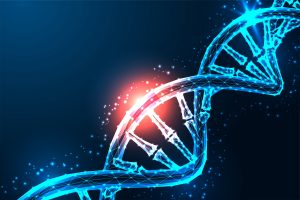Published on April 24, 2024
Help protect your DNA and improve its utilization by ensuring adequate concentrations of vitamin D, magnesium and omega 3s
Key Points
- Nutritional genomics, also known as nutrigenomics, is a growing field of research on the effects that certain nutrients can have on genetic expression; optimizing the intake of such nutrients and correcting their deficiencies are considered “low-hanging fruit” among many scientists, meaning that addressing this is one of the easiest and simplest changes anyone can make to have the biggest impact on our genes and our health.
- Magnesium is a cofactor in hundreds of enzymes including those involved in DNA metabolism, replication and repair; some studies have shown that magnesium is essential for protecting DNA from damage and maintaining the integrity of DNA structure
- Another study found that non-smokers with a low Omega-3 Index had a similar life expectancy to smokers with a high Omega-3 Index; in other words, a low Omega-3 Index has a similar effect on life expectancy than smoking
 National DNA Day (April 25th) celebrates the greatest scientific achievements in the field of genomics and all we have learned about our DNA, with an added goal of exploring how those advances can impact our lives and our health.
National DNA Day (April 25th) celebrates the greatest scientific achievements in the field of genomics and all we have learned about our DNA, with an added goal of exploring how those advances can impact our lives and our health.
Nutritional genomics, also known as nutrigenomics, is a growing field of research on the effects that certain nutrients can have on genetic expression. Several key nutrients are now known affect how well the body can access, read, and utilize the DNA. These nutrients can also help protect DNA against damage due to oxidative stress. Optimizing the intake of such nutrients and correcting their deficiencies are considered “low-hanging fruit” among many scientists, meaning that addressing micronutrient intake and levels is one of the easiest and simplest changes anyone can make to have the biggest impact on our genes and our health.
Watch the video below to learn more about three main micronutrients that can have the biggest impact on our genes, longevity, and aging: vitamin D, magnesium, and omega-3s.
Health and Longevity Benefits of Vitamin D, Omega-3s, and Magnesium
Is our age solely determined by the number of years we have lived? While chronological age is calculated the same for everyone (based on how old we are in years), biological age is more representative of overall physiological and functional health, including the risk of age-related conditions and diseases.
On the other hand, epigenetic aging is related to the modification of our genes, specifically through DNA methylation, which may in turn directly affect the biological age of an individual. Research has shown that lifestyle and nutrition factors (nutrigenomics) play a role in epigenetic aging, and that supplementation with specific nutrients may slow or reverse it.
During genomic and metabolic activities, nutrients such as vitamin D, magnesium, and other cofactors get consumed. Magnesium, for example, is a cofactor in hundreds of enzymes including those involved in DNA metabolism, replication and repair, and protection of DNA from oxidative damage. Some studies have shown that magnesium is essential for protecting DNA from damage and maintaining the integrity of DNA structure. Therefore, these cells need a continuous supply of these micronutrients for proper physiological functions.
Learn More by Watching the Video: “Powerful Health Habits to Delay Biological Aging” with Rhonda Patrick, PhD
Video Summary
Vitamin D
Enters the nucleus to regulate genes
Up to nearly 5% of our genes are turned on or off by vitamin D
Vitamin D is very important for the regulation of our DNA
When don’t have enough vitamin D, genes aren’t regulated the way they are supposed to be, causing things to “going awry”
Nearly 70% of Americans have insufficient or deficient vitamin D levels
Mouse models demonstrate how vitamin D deficiency accelerates aging
Low vitamin D levels increase mortality risk
Another study shows that vitamin D supplementation reverses epigenetic age by about 2 years
Adequate levels defined as at least 30 ng/ml, with the “sweet spot” for vitamin D between 40-60 ng/ml
Dr. Patrick recommends starting with 4000 IU vitamin D per day followed by testing the blood level after supplementing to make sure the dose is adequate
Magnesium (Mg)
About half of the US population has inadequate levels of magnesium
Magnesium is found at the center of a chlorophyll molecule; dark leafy greens are a good source of Mg
Mg is needed by enzymes that ameliorate DNA damage, a hallmark of aging
Mg levels and intake have been correlated with cancer risk and mortality, and overall mortality
It is best to get Mg from dietary sources, adding supplements to ensure adequacy – the required amount depends on age, gender, etc.
10-20% more Mg per day than RDA is required for those who sweat, such as who exercise or use a sauna
Omega-3s
A study found that low consumption of omega-3s from seafood is on the top 6 preventable causes of death, and is estimated to cause approximately 84,000 deaths per year
Consuming trans-fats was also among the top 6
A high Omega-3 Index is associated with a 90% reduced risk of sudden cardiac death and a 5-year increased life expectancy
Non-smokers with a low Omega-3 Index had a similar life expectancy to smokers with a high Omega-3 Index; in other words, a low Omega-3 Index has a similar effect on life expectancy than smoking
Supplementing with about 2 grams or more of DHA + EPA per day can elevate the Omega-3 Index to 8%
Exercise – Putting in the Work (It’s not as simple as taking a pill…)
Vigorous exercise is the most powerful longevity drug you could get to delay the aging process and improve the lifespan
Vigorous exercise = getting to 75-80% of maximum heart rate
Cardiorespiratory fitness improves longevity; biggest improvement is from low-normal VO2 max to anywhere above
No upper limit to mortality reduction found with exercise
High intensity interval training might be the best way to increase VO2 max (4×4 interval training protocol)
Vigorous exercise reverses structural changes of the aging heart
Lactate generated from muscles during exercise is consumed by the brain, heart, liver, etc. as an easily utilized energy molecule and a signaling molecule; increases brain-derived neurotrophic factor (BDNF), which is responsible for neuroplasticity, and increases neurotransmitters such as serotonin and norepinephrine
Exercise snacks also make a big difference!
What Are Your Levels?
As part of the GrassrootsHealth D*action project, you can measure your:
- Vitamin D
- Magnesium PLUS Essential and Toxic Elements
- Omega-3 Fatty Acids
- hsCRP
- HbA1c
- TSH
- Type 1 Diabetes Autoantibodies
Take steps to improve the status of each of these measurements to benefit your overall health. You can also track your own intakes, symptoms and results to see what works best for YOU.
Enroll and test your levels today, learn what steps to take to improve your status of vitamin D (see below) and other nutrients and blood markers, and take action! By enrolling in the GrassrootsHealth projects, you are not only contributing valuable information to everyone, you are also gaining knowledge about how you could improve your own health through measuring and tracking your nutrient status, and educating yourself on how to improve it.






